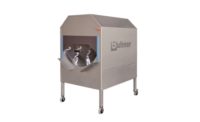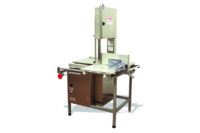FOOD QUALITY AWARDS
A Cut Above
Technological advances help Hormel Foods earn the 6th Annual Food Quality Award
It was 1923 when George A. Hormel gave an employee the same sage advice undoubtedly instilled in him while working in his uncle’s meat market during the late 1800s.
“What you get out of this business depends wholly on how much you put into it,” he wrote. “Don’t expect big results unless you are personally analyzing your work to see how you can bring it up to a higher standard.”
For more than 100 years, Austin, Minn.-based Hormel Foods — the winner of the 2006 Food Quality Award — has cultivated that value, bringing to fruition technologies that kill foodborne pathogens and maintaining a training program that embraces HACCP, food security and employee hygiene.
Four of the seven judges for the 6th Annual Food Quality Award selected Hormel, while two voted for West Liberty Foods LLC (West Liberty, Iowa). The seventh judge abstained. Other entries included Standard Meat Co. (Dallas, Texas), Edward G. Sherwin Consultants LLC (Lutherville, Md.), Hermann Laue Spice Co. Inc. (Helecanada; Uxbridge, Ontario) and McDonald’s Puerto Rico.
While husband and wife judges Lawrence and Mary Ann Platt differed on the winner of last year’s 5th Annual Food Quality Award — she picked Tyson Food Safety and Laboratory Services Network (Springdale, Ark.), and he picked SYSCO Corp. (Houston, Texas) — they were on the same page when it came to Hormel. The pair run two Darien, Ill.-based quality and safety consulting firms.
“The submission and supporting information provided tangible examples of Hormel’s commitment to quality and innovation — which are two of the stated cornerstones of their business,” says Lawrence Platt, president of RQA Inc. “They clearly recognize the importance of providing a quality product and have established the framework to engage their employees and the community in their vision.”
Mary Ann Platt, president of CNS/Food Safety, echoed that sentiment, saying Hormel’s innovative technology improves food safety and quality.
“This, in addition to their overall community involvement and contribution to the industry, makes them a clear winner for the Food Quality Award,” she says.
More than 250 food safety and quality professionals were on hand at the March presentation and reception, hosted by DuPont Qualicon, during the Food Safety & Security Summit in Washington, D.C.
Bryan Farnsworth, vice president of quality management for Hormel, accepted the award on behalf of the company, saying quality and safety are collaborative efforts to protect consumers, meet regulatory requirements and protect the brand name.
“This is an excellent award, and we are very honored to receive it and join the group of Food Quality Award winners,” he says.
Along with commitments to food quality, safety and security, a key component in Hormel’s award entry was the application of its high-pressure processing (HPP) technology, TRUETASTE. According to Hormel officials, the process extends shelf life to 120 days because the process kills more types of foodborne pathogens than other processes.
“The secret behind Natural Choice [deli meats] is pressure — lots of it,” says Phillip Minerich, head of research and development at Hormel. “Packaged slices of turkey or ham are given a bath at 87,000 pounds per square inch in an eight-foot-tall steel cylinder that’s like a vertical gun on the [battleship] U.S.S. Arizona. The pressure is six times what you’d find at the bottom of the Pacific Ocean, and it squashes the life out of any pathogens on the meat.”
The event at which the award was presented by Food Quality magazine also gave attendees an opportunity to hear insights from some of the world’s leading business and food safety experts.
Marc Gunther, senior writer for Fortune magazine, discussed the changing dynamics between margin-driven efficiencies and long-term sustainability at some of today’s most recognized companies — including Nike, McDonald’s, Texas Instruments, Dell, S.C. Johnson, Wal-Mart and DuPont.
“Sustainability is usually used in terms of the environment, but I like to think of it more broadly to mean that you are running your company in a way that leaves the world better off, not worse,” he says. “Despite the scandals — indeed, partly because of the scandals — corporate America is changing for the better. You can make a difference as a leader, consumer and investor by living your values every day.”
Other speakers included Siqun Wang, M.D., Ph.D., director of R&D for DuPont Qualicon, and Ravi Ramadhar, director of business development, DuPont Qualicon. Dr. Wang discussed how emerging technologies affect productivity and quality standards. Ramadhar, who served as the master of ceremonies, paid tribute to past winners of the Food Quality Award and spoke about the commitment of DuPont to science, innovation and sustainability.





